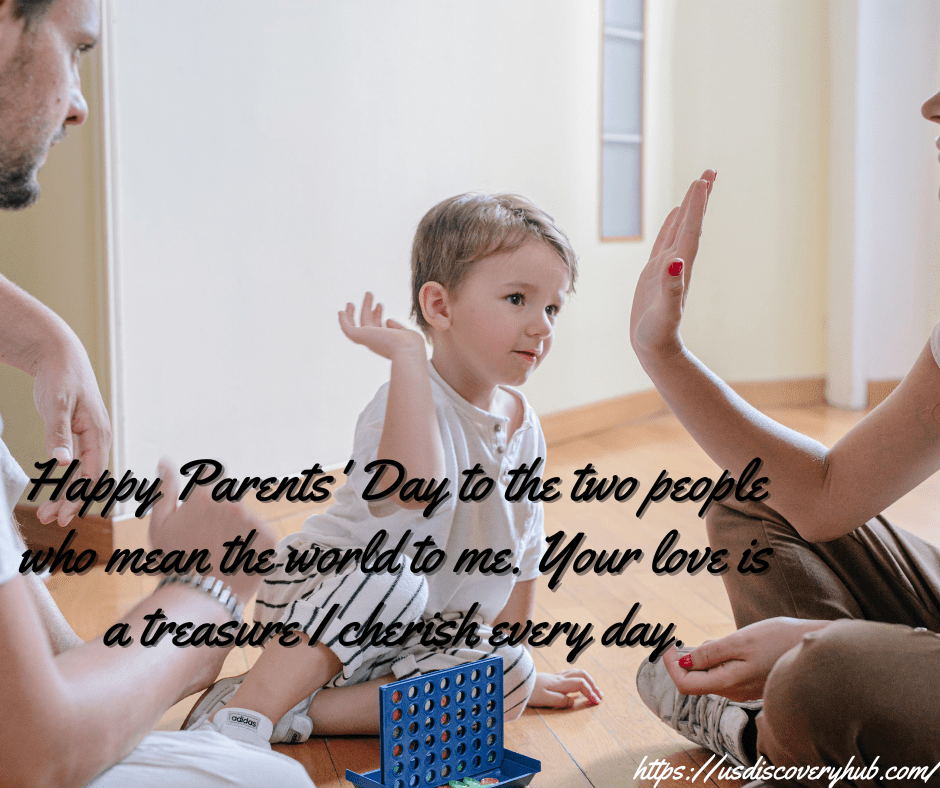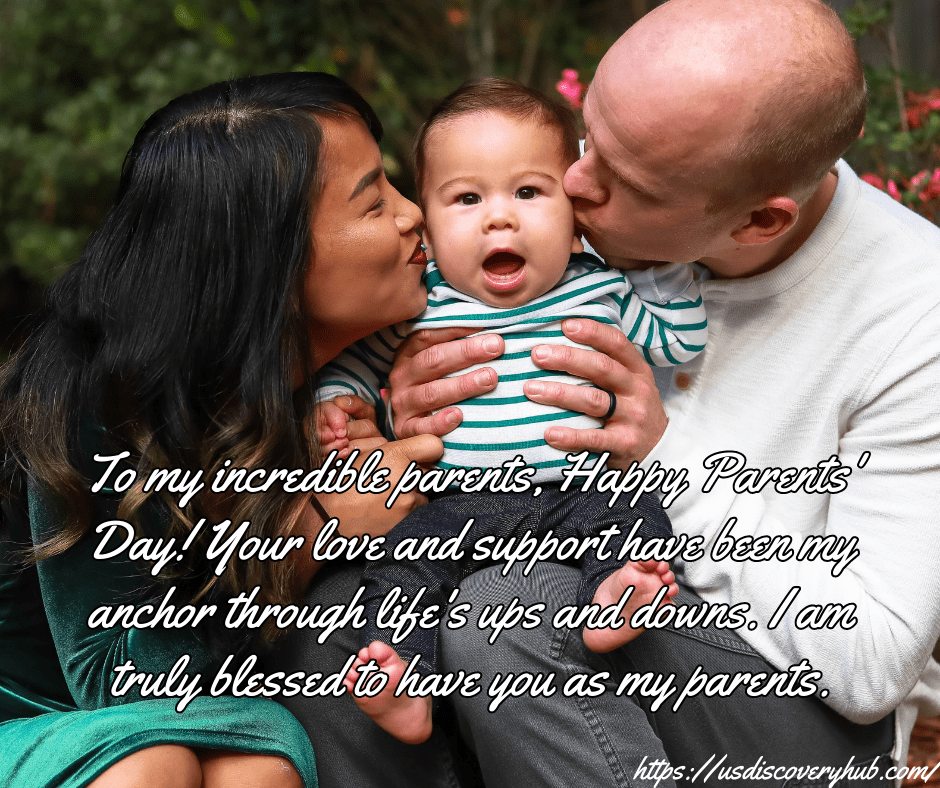“Cherishing Parenthood: Celebrating the Love and Dedication of Parents on Parents’ Day”
On this special occasion of Parents’ Day, we come together to express heartfelt gratitude to the pillars of love in our lives. Parents’ Day serves as a reminder of the unwavering support, sacrifices, and affection our parents have bestowed upon us. Today, we celebrate their selflessness, guidance, and profound impact on our growth. Join us as we pay tribute to the unbreakable bond between parents and children, cherishing the invaluable role they play in shaping our lives with love and care.

The Origins of Parents’ Day
Parents’ Day traces its roots back to the early 20th century when a loving daughter, Anna Jarvis, sought to create a day to recognize the invaluable contributions of parents. Inspired by the success of Mother’s Day and Father’s Day, Jarvis envisioned a day that would honor both parents together. Her relentless efforts culminated in the establishment of the first Parents’ Day in the United States.
In 1994, President Bill Clinton signed a Congressional Resolution into law, officially designating the fourth Sunday of every July as National Parents’ Day. Since then, this special day has been celebrated annually, highlighting the significance of parental figures in every child’s life.
Parenting Styles and Their Impact on Children
Parenting is a complex and multifaceted journey that significantly shapes a child’s development, behavior, and overall well-being. Different parenting styles have emerged over time, each characterized by unique approaches to discipline, communication, and emotional support. In this blog post, we will explore four common parenting styles – authoritative, permissive, authoritarian, and neglectful – and examine their respective impacts on children. Understanding the effects of parenting styles can empower parents to make informed decisions that promote positive child outcomes.
1. Authoritative Parenting
Authoritative parenting is often regarded as the most effective and balanced approach. Parents who follow this style set clear boundaries while maintaining open communication with their children. They are nurturing and responsive to their child’s emotional needs, fostering a strong sense of trust and security. Research shows that children raised by authoritative parents tend to have higher self-esteem, better social skills, and a greater sense of independence.
Authoritarian parenting is characterized by high demands and strict rules. Parents adopting this style expect obedience without question, and disciplinary measures are frequently used. While children may display discipline and orderliness, they may also experience lower self-esteem, anxiety, and a reluctance to express themselves. Striking the right balance between discipline and emotional support is crucial for minimizing the potential negative effects of this parenting style.
2. Permissive Parenting: Freedom with Few Limits
Permissive parents are lenient and offer their children a high degree of freedom. They avoid setting strict rules and may be reluctant to impose consequences for misbehavior. While this parenting style can result in a close and affectionate relationship, it may also lead to behavioral issues and difficulties with self-control. Children raised in permissive environments may struggle to follow rules and may exhibit entitlement behaviors.
3. Neglectful Parenting: Absence and Lack of Engagement
Neglectful parenting involves a lack of emotional engagement and limited involvement in a child’s life. Parents may be unresponsive to their children’s needs and may prioritize personal interests over parenting responsibilities. This style can have severe negative consequences on a child’s emotional and psychological well-being, leading to feelings of insecurity, low self-esteem, and emotional detachment.
4. The Impact of Parenting Styles on Child Development
Research consistently shows that authoritative parenting tends to produce children who are more socially competent, emotionally secure, and academically successful. On the other hand, authoritarian and permissive parenting styles have been linked to potential challenges in social interactions, emotional regulation, and academic achievement. Neglectful parenting, with its lack of emotional support and involvement, can have the most detrimental effects on a child’s overall development.
Parent-Child Relationships and Mental Health
The parent-child relationship plays a fundamental role in a child’s mental health and emotional well-being. From infancy to adolescence, the quality of this bond significantly impacts a child’s psychological development and coping abilities. A secure and nurturing parent-child relationship provides a foundation of trust and emotional support, fostering a child’s sense of safety and self-confidence.
Children who experience positive and loving interactions with their parents are more likely to develop healthy emotional regulation skills and have higher self-esteem. These children tend to exhibit better resilience when facing challenges and stressors in life. Additionally, strong parent-child relationships create a safe space for children to express their feelings and thoughts openly, leading to enhanced emotional intelligence.
Conversely, strained or negative parent-child relationships can have detrimental effects on a child’s mental health. Constant conflict, neglect, or inconsistent parenting can contribute to feelings of anxiety, depression, or emotional instability in children. Such experiences may hinder the child’s ability to form healthy relationships later in life and can even lead to long-term psychological issues.
Recognizing the significance of the parent-child relationship in mental health, parents are encouraged to engage in open communication, active listening, and empathy. Being attuned to their child’s emotional needs and providing a supportive and loving environment can have a profound positive impact on the child’s emotional well-being. Professional counseling and family therapy can also be valuable resources to strengthen parent-child relationships and promote mental health for both parents and children.
Balancing Work and Family Life
Balancing work and family life has become an increasingly significant challenge in today’s fast-paced and demanding world. As the demands of the workplace and the responsibilities of family life intersect, many individuals find themselves struggling to strike the right balance. This delicate juggling act requires careful consideration, time management, and prioritization.
At the heart of the matter lies the importance of establishing clear boundaries between work and family time. Setting realistic expectations at work and communicating openly with employers about family commitments can help create a supportive environment. Additionally, involving family members in decision-making and planning can foster a sense of cooperation and understanding.
Practicing effective time management is essential to ensure both work and family obligations are met. Prioritizing tasks, setting aside quality family time, and avoiding unnecessary distractions during work hours can contribute to a more harmonious balance.
Flexibility is also key. Embracing flexible work arrangements, if possible, can offer the freedom to attend family events and handle unexpected situations without compromising professional responsibilities.
Furthermore, self-care is vital to maintaining this equilibrium. Taking time for personal well-being and relaxation helps prevent burnout and ensures individuals can be present and engaged with their families.
Ultimately, achieving a successful balance between work and family life requires ongoing effort and adjustment. Striving for a harmonious integration of these crucial aspects can lead to a fulfilling and enriched life, where both career success and cherished family moments thrive.

Parenting Challenges in the Digital Age
Parenting in the digital age presents a unique set of challenges for modern parents. The rapid advancement of technology has transformed the way we interact, learn, and entertain ourselves, but it has also introduced new complexities and concerns in raising children. One of the most significant challenges is managing screen time and its potential impact on children’s physical and mental well-being. Excessive use of smartphones, tablets, computers, and other digital devices can lead to issues such as sleep disturbances, reduced physical activity, and diminished social skills.
Another challenge is ensuring online safety and protecting children from inappropriate content and cyber threats. The internet can be a vast and unpredictable space, and parents must navigate the delicate balance between granting independence and providing necessary supervision.
Moreover, the digital age brings with it the prevalence of social media platforms, which can contribute to cyberbullying, peer pressure, and unrealistic comparison among children. Helping children develop a healthy digital identity and fostering responsible online behavior becomes imperative.
Furthermore, the rapid dissemination of information through the internet exposes children to various perspectives and potentially harmful content, making it essential for parents to guide their children in critical thinking and media literacy.
Parenting in the digital age requires constant adaptation and open communication with children about the potential risks and benefits of technology. By setting clear boundaries, modeling healthy tech habits, and actively engaging in their online experiences, parents can navigate these challenges and ensure that their children become responsible and well-informed digital citizens.
Parenting Children with Special Needs
Parenting children with special needs presents unique challenges and opportunities for growth and understanding. These exceptional children require extra care, attention, and support to navigate a world that may not always be fully accommodating to their needs. Parents of children with special needs often demonstrate immense resilience, patience, and unconditional love in their journey of raising their child.
One of the crucial aspects of parenting children with special needs is advocating for their rights and ensuring they receive appropriate resources and services. This might involve working closely with healthcare professionals, educators, and support groups to create an inclusive and nurturing environment.
Parenting a child with special needs also demands flexibility and adaptability. Each child’s condition is distinct, and parents must be open to finding individualized approaches to address their child’s specific challenges and strengths. Moreover, celebrating their achievements, no matter how small, can boost their self-esteem and motivation.
Emotional support is equally vital in this journey. Parents often experience a wide range of emotions, from joy and pride in their child’s progress to moments of frustration and concern. Seeking support from other parents in similar situations or from mental health professionals can be tremendously beneficial.
Parenting children with special needs can be an incredibly rewarding experience, as it fosters empathy, compassion, and a deep understanding of the diversity of human experiences. It is an opportunity for parents to grow alongside their children, creating a bond built on love, acceptance, and the unwavering belief in their child’s potential to thrive and flourish.
Parents’ Day quotes
Quotes to celebrate Parents’ Day:
- “A parent’s love knows no bounds, it is a love that lasts a lifetime.”
- “Parents are like the sun, always shining bright in our lives.”
- “The best thing a parent can give their children is their time and love.”
- “Parents are the roots that hold us strong and steady as we grow.”
- “A parent’s love is the most beautiful melody a child can hear.”
- “In the garden of life, parents are the most precious flowers.”
- “Parents’ love is the fuel that drives us to achieve our dreams.”
- “The love of parents is a guiding light that leads us through life’s journey.”
- “Parents’ love is a treasure that we carry with us always.”
- “Parents are the anchors that keep us grounded in the stormy sea of life.”
- “A parent’s hug is a comforting shelter from the storms of life.”
- “Parents are our first teachers, teaching us the lessons of love and kindness.”
- “Parents’ love is the foundation upon which our lives are built.”
- “The love of parents is a precious gift that never fades.”
- “Parents are the guardian angels that watch over us day and night.”
- “A parent’s love is the most powerful force in the universe.”
- “Parents’ love is a masterpiece that colors our world with joy and happiness.”
- “Parents are the architects of our character and the builders of our future.”
- “A parent’s love is a light that illuminates our darkest days.”
- “Parents’ love is a magic potion that heals all wounds.”
- “Parents are the greatest superheroes in the eyes of their children.”
- “Parents’ love is the greatest gift we receive in life.”
- “A parent’s smile can brighten even the darkest of days.”
- “Parents are the first and forever friends we have in life.”
- “Parents’ love is the shelter that protects us from life’s storms.”
- “A parent’s love is like a warm blanket that wraps us in comfort and safety.”
- “Parents’ love is the melody that lingers in our hearts forever.”
- “Parents are the guardian angels that guide us through life’s twists and turns.”
- “A parent’s love is the glue that holds our family together.”
- “Parents’ love is the greatest strength that empowers us to face any challenge.”
- “Parents are the stars that light up our darkest nights.”
- “A parent’s love is the key that unlocks the door to our dreams.”
- “Parents’ love is the greatest source of inspiration in our lives.”
- “Parents are the pillars that support us in times of need.”
- “A parent’s love is a treasure that enriches our lives every day.”
- “Parents’ love is the song that fills our hearts with joy.”
- “Parents are the gentle breeze that soothes our soul.”
- “A parent’s love is a symphony of affection that never ends.”
- “Parents’ love is the compass that guides us on the right path.”
- “Parents are the storytellers who weave the fabric of our family history.”
- “A parent’s love is the bridge that connects us to our past and future.”
- “Parents’ love is the spark that ignites the fire within us.”
- “Parents are the cheerleaders who celebrate our every success.”
- “A parent’s love is the anchor that keeps us steady in life’s storms.”
- “Parents’ love is the heartbeat that resonates in our souls.”
- “Parents are the gardeners who nurture us to bloom and flourish.”
- “A parent’s love is the armor that shields us from life’s challenges.”
- “Parents’ love is the sweetest melody in the symphony of life.”
- “Parents are the lighthouses that guide us through life’s rough waters.”
- “A parent’s love is the greatest gift we could ever receive.”
Happy Parents Day Wishes













Parents’ Day celebration
Express Your Love: Take the time to express your love and appreciation to your parents with heartfelt words, hugs, or a sincere letter. Let them know how much they mean to you and the impact they have had on your life.
Quality Time: Spend quality time with your parents on this special day. Plan activities that you can enjoy together, such as a family meal, a picnic in the park, or a movie night at home.
Gifts and Surprises: Show your love with thoughtful gifts or surprises that reflect their interests and preferences. It could be something they’ve always wanted or a sentimental gift to cherish.
Handmade Creations: Create something special for your parents, such as a handmade card, a photo album filled with cherished memories, or a DIY gift that shows your love and effort.
Cook for Them: Prepare a delicious meal or bake their favorite treats as a gesture of love. The effort you put into cooking for them will be appreciated and cherished.
Family Gathering: Organize a family gathering to celebrate Parents’ Day together. Invite extended family members to join in the festivities and create lasting memories.
Personalized Activities: Plan activities that your parents enjoy, such as a hike, a visit to their favorite museum or art gallery, or a day out exploring places they love.
Give Back: Participate in community service or charitable activities together as a family. Doing something meaningful and giving back to others can create a deeper sense of connection and purpose.
Write a Tribute: Write a heartfelt tribute or poem for your parents and read it out loud during a family gathering or a special moment dedicated to them.
Family Movie Night: Enjoy a movie marathon with films that celebrate the importance of family and parenthood. It could be a mix of heartwarming dramas, comedies, or animated movies that everyone can enjoy.
Memory Lane: Look through old photo albums or home videos together, reminiscing about cherished moments from the past. This can evoke nostalgia and strengthen your bond.
Virtual Celebration: If distance separates you from your parents, arrange a video call to spend time together virtually and celebrate Parents’ Day.

Facts about Parents’ Day
Establishment: Parents’ Day was signed into law by President Bill Clinton in 1994. It is observed on the fourth Sunday of July each year.
Combination of Mother’s Day and Father’s Day: Parents’ Day was created to recognize and appreciate both mothers and fathers for their contributions to their children’s lives. It combines the sentiments of Mother’s Day and Father’s Day into one inclusive celebration.
Similar to Children’s Day: In countries like South Korea and Taiwan, Children’s Day and Parents’ Day are celebrated together on May 5th. This emphasizes the family bond and the reciprocal relationship between parents and children.
Gift-Giving: Similar to other holidays, people often give gifts, flowers, or cards to their parents on Parents’ Day as a token of their love and appreciation.
Supporting Families: Parents’ Day aims to promote responsible parenting and strengthen family bonds. It emphasizes the importance of parental involvement in a child’s upbringing and development.
International Observance: While Parents’ Day was first recognized in the United States, many other countries have also adopted similar celebrations to honor parents and caregivers.
Activities and Events: On Parents’ Day, various activities and events are organized to celebrate families, including family picnics, outings, and community gatherings.
Parenting Awards: Some organizations and communities present parenting awards to exceptional parents who have made significant contributions to their children’s lives and the community.
Importance of Grandparents: Parents’ Day also recognizes the valuable role that grandparents play in the lives of their grandchildren and their influence on family dynamics.
Unofficial Symbol: The forget-me-not flower is often associated with Parents’ Day, serving as a symbol of love and remembrance.
FAQs about Parents’ Day
What is Parents’ Day?
Parents’ Day is a special observance dedicated to honoring and appreciating parents for their love, sacrifices, and contributions to the well-being of their children and families. It is a day to recognize the essential role parents play in nurturing and shaping the lives of their children.
When is Parents’ Day celebrated?
Parents’ Day is typically celebrated on the fourth Sunday of July each year. However, the date may vary depending on the country or region.
How did Parents’ Day originate?
Parents’ Day was established in the United States in 1994. President Bill Clinton signed a Congressional Resolution into law, designating the fourth Sunday of July as Parents’ Day. The holiday was created to complement Mother’s Day and Father’s Day, acknowledging both parents’ importance in raising children.
What is the significance of Parents’ Day?
Parents’ Day is significant as it highlights the vital role parents play in the lives of their children and acknowledges their unconditional love and support. It encourages people to express gratitude to their parents and promotes family values and togetherness.
How is Parents’ Day celebrated?
Parents’ Day is celebrated in various ways, including spending quality time with parents, giving them thoughtful gifts or cards, organizing family gatherings or meals, and expressing appreciation through acts of love and kindness.